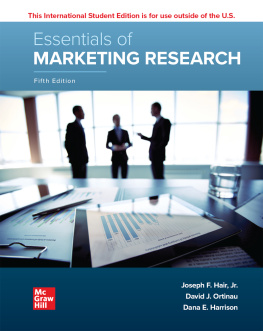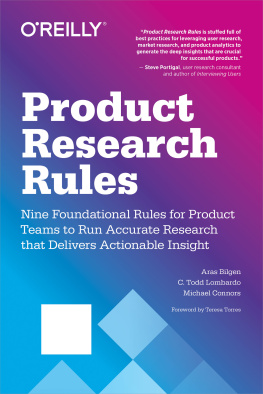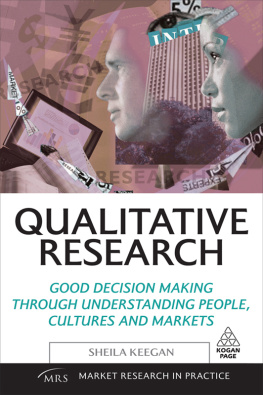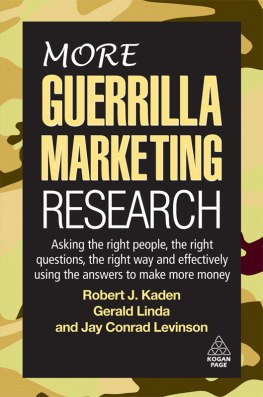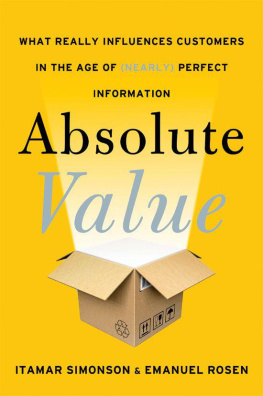Praise for
CONSUMER.OLOGY
This is an eye-opening, thoroughly researched and tightly argued book. It will alarm some, enrage others and state the obvious for many.
Danny Flamberg, Manhattan Marketing Maven
Consumer behavior consultant Graves maintains that the most important factor that influences the publics opinion of a product is the subconscious or unconscious. He contends that asking individuals to describe why they like or dont like a product can only represent the conscious aspects and not the overarching unconscious facets that pervade our decision-making processes A good read for anyone interested in the psychology of group behavior or the validity of market research methods as well as for those in the business sector trying to introduce new products to the public.
Poppy Johnson-Renvall in Library Journal (US)
The author takes us on a fascinating romp through the psychological underpinnings of consumer behaviour Its well written, accessible and entertaining, yet thought provoking.
Consumer.ology is a rich digest of insights on consumer psychology. It should be essential reading for marketers and general managers, and carefully hidden away from anyone whose livelihood depends on market research.
Alan Giles, The Marketing Society and Associate Fellow,
Sad Business School, University of Oxford
Consumer.ology is a publishing phenomenon Graves has transformed what was largely guesswork into something approaching a new branch of science -- the science of consumer behaviour. And because his writing style is light, its a happy read. Its only later that you realise hes managed to realign your radar and liberate your thinking.
Cambridge Business Magazine
There are lots of great anecdotes and examples in this excellent book.
Faris Yakob, Talent imitates, genius steals blog
This is a well-researched, lucidly written book that will force the market research industry to address some fairly troubling questions about what it does and how it does it. By implication, the academic research business is in the firing line too, given that empirical data is often collected using the same techniques.
John Fahy, Professor of Marketing and author of the bestselling textbook Foundations of Marketing
After a career in market research, Graves delivers a stinging rebuke to his profession. He does more than just show marketers the error of their ways. He shows them a path to better insight.
Richard Cree in Director magazine
One of Director magazines 10 original thinkers, 10 big ideas to shape the UKs recovery
[A] withering critique of market research science Consumer.ology is primarily aimed at a business readership but theres thought-provoking stuff in here for the rest of us.
The Scotsman
Fascinating stuff.
Steve Wright, BBC Radio 2
Consumer.ology is a refreshingly iconoclastic skewer through the heart of traditional market research methods and reason. Graves peppering of psychological theory with pithy anecdotes of misguided consumer successes and failures is bound to at once ruffle feathers and get heads nodding within marketing and innovation circles.
Blake H. Glenn, Senior Inventor, ?What If! The Innovation Company
CONSUMER.OLOGY
The Truth about Consumers and
the Psychology of Shopping
PHILIP GRAVES

To my father, Ray, who encouraged me to think.
This revised paperback edition first published by
Nicholas Brealey Publishing in 2013
First published in 2010
35 Spafield Street
Clerkenwell, London
EC1R 4QB, UK
Tel: +44 (0)20 7239 0360
Fax: +44 (0)20 7239 0370 | 20 Park Plaza
Boston
MA 02116, USA
Tel: (888) BREALEY
Fax: (617) 523 3708 |
www.nicholasbrealey.com
www.philipgraves.net
Philip Graves 2010, 2013
The right of Philip Graves to be identified as the author of this work has been asserted in accordance with the Copyright, Designs and Patents Act 1988.
ISBN: 978-1-85788-576-7
eISBN: 978-1-85788-923-9
British Library Cataloguing in Publication Data
A catalogue record for this book is available from the
British Library.
All rights reserved. No part of this publication may be reproduced, stored in a retrieval system, or transmitted, in any form or by any means, electronic, mechanical, photocopying, recording and/or otherwise without the prior written permission of the publishers. This book may not be lent, resold, hired out or otherwise disposed of by way of trade in any form, binding or cover other than that in which it is published, without the prior consent of the publishers.
Printed in the UK by Clays Ltd, St Ives plc.
CONTENTS
ABOUT THE AUTHOR
Philip Graves is a consumer behavior consultant, author, and speaker. Twenty years observing consumers as a market research manager and research consultant made him aware of a conflict between what people said in research and what they actually did, which led to the introduction of the psychology of shopping into his work. He has advised numerous international businesses, including Comet, ITV, Whirlpool, Dr Martens, New Covent Garden Food Company, Camelot, Virgin Media, Hotpoint, and Pepsi. In addition to running his own consultancy business, Shift, Philip is an associate of Frontier Economics.
See his website at www.philipgraves.net .
FOREWORD
by KEVIN HOGAN
It begins with considering someones past choices
Why did you go and do that?
I dont know!
What were you thinking?
I was hoping
(or some other on-the-spot confabulation or after-the-fact rationalization is constructed here)
that XYZ was going to happen.
And then there is the prediction of future behavior
Would you buy this product, if it were in the store?
Yes, it would be great! I love it.
If we offered this service would you buy it?
Definitely.
When looking at the future, people have almost no fortune-telling ability as to how they will behave or what they might or might not buy. Furthermore, they certainly cant accurately tell you why they did something in the past.
Now you dont have to ask.
The human brain operates on a system of short cuts and rules of thumb. Without these corner-cutting decision-making tools wed never get anything done in life. And because of the same neural wiring, we often get ourselves in a heap of trouble doing some incredibly foolish things.
Throughout human behaviors there are dozens of types of short cuts in decision making that help you know what people will do in the future. You can also pretty much know why people did things in the past without asking them.
And for businesses which need to bring profitable products and services to market, they never have to burn good money on focus groups, which have a horrible track record for predicting future results of behavior for most types of products and services.
Philip Graves has put together an excellent guide to understanding how to know what people will and wont do. Hell show you why people did things in the past that made no sense at all, both in retrospect and in real time.
Ive studied consumer behavior for two decades and have concluded that there is a profitable and useful way to navigate the very expensive waters of product testing and understanding the drives and emotions behind the rationale and thinking of consumers decision making.
Next page


